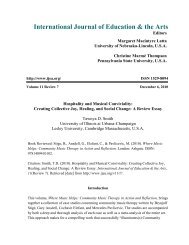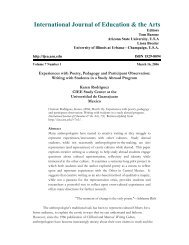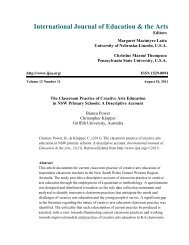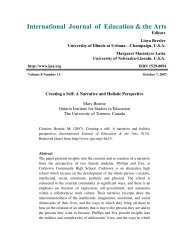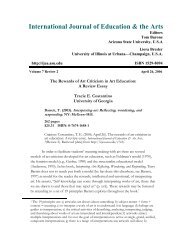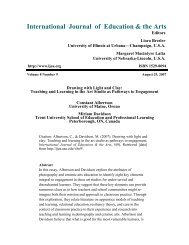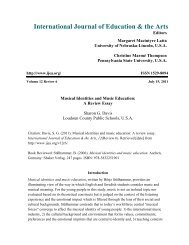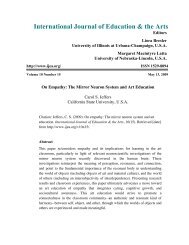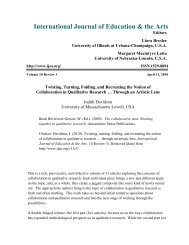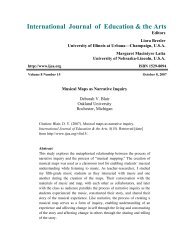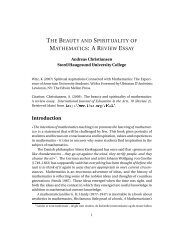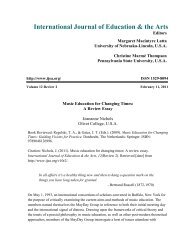This review essay is available in PDF format. - International Journal ...
This review essay is available in PDF format. - International Journal ...
This review essay is available in PDF format. - International Journal ...
You also want an ePaper? Increase the reach of your titles
YUMPU automatically turns print PDFs into web optimized ePapers that Google loves.
Westerlund: Seek<strong>in</strong>g the Significance 3<br />
character<strong>is</strong>tic of music, educators severely mix music and teach<strong>in</strong>g, <strong>in</strong> fact it could be any<br />
teach<strong>in</strong>g <strong>in</strong> any other field, <strong>in</strong> th<strong>is</strong> way committ<strong>in</strong>g “a moral crime”. Writes Reimer, “It <strong>is</strong> for<br />
th<strong>is</strong> reason that it <strong>is</strong> of the utmost importance that any self-justification for music education be<br />
rid of the appurtenances which obscure and weaken its real import” (p. 11).<br />
Reimer’s own stance <strong>is</strong> clear: “It <strong>is</strong> with the depth of each <strong>in</strong>dividual’s personal experience<br />
with which art <strong>is</strong> concerned, and not, as <strong>is</strong> so commonly thought <strong>in</strong> art education, the<br />
horizontal relationships between person and person” (p. 12, writer’s emphas<strong>is</strong>). <strong>Th<strong>is</strong></strong> justifies<br />
art <strong>in</strong> our public schools and it <strong>is</strong> the task of music educators to provide opportunities for th<strong>is</strong>.<br />
A philosophy of music education, by explicat<strong>in</strong>g th<strong>is</strong> personal experience, lays the foundation<br />
for understand<strong>in</strong>g the power of music education as well as directs the dec<strong>is</strong>ions <strong>in</strong> practice: <strong>in</strong><br />
other worlds, philosophy gives the practice and the profession its needed boundaries of selfunderstand<strong>in</strong>g.<br />
It <strong>is</strong> not clear how much Reimer’s position <strong>is</strong> <strong>in</strong>fluenced by a certa<strong>in</strong> k<strong>in</strong>d of notion of<br />
experience or by the music education practices of the United States, however, the focus on<br />
personal experience demarcates h<strong>is</strong> position from current socio-cultural tendencies <strong>in</strong><br />
theoriz<strong>in</strong>g music education as well as from the critique towards classroom practices that do<br />
not take <strong>in</strong>to account the “real-world” social dimensions of music mak<strong>in</strong>g. Secondly, it can be<br />
argued – by us<strong>in</strong>g Reimer’s own counter argumentation – that many other subjects with<strong>in</strong> the<br />
school curriculum may also <strong>in</strong>fluence a student’s personal experience <strong>in</strong> a deep way. In that<br />
respect, what <strong>is</strong> after all special about music education Thirdly, <strong>in</strong> practice a teacher has to<br />
agree with the values that the school <strong>in</strong> general, <strong>in</strong> each particular context, expects from its<br />
teachers. For <strong>in</strong>stance, the F<strong>in</strong>n<strong>is</strong>h national curriculum base demands that every subject, also<br />
music, creates learn<strong>in</strong>g environments that are democratic and <strong>in</strong> which social values need to<br />
be taken <strong>in</strong>to account <strong>in</strong> all subjects. The personal emotional value of music needs to be<br />
comb<strong>in</strong>ed with other values, such as horizontal relationships between <strong>in</strong>dividuals. <strong>Th<strong>is</strong></strong> <strong>is</strong> to<br />
say that any other k<strong>in</strong>d of music educational practice would be at least educational<br />
malpractice, if not ill-legal. Aga<strong>in</strong>, Reimer argues that it <strong>is</strong> f<strong>in</strong>e to recogn<strong>is</strong>e these other values<br />
as long as the teacher does not confuse what <strong>is</strong> specifically musically valuable and what <strong>is</strong><br />
otherw<strong>is</strong>e educationally valuable; someth<strong>in</strong>g that any teacher could contribute. For Reimer,<br />
any other m<strong>in</strong>ority value should be subord<strong>in</strong>ated to musical value and th<strong>is</strong> pr<strong>in</strong>ciple should<br />
guide practice <strong>in</strong> schools and other educational places. <strong>Th<strong>is</strong></strong> means that, for example, social<br />
<strong>is</strong>sues are not taken as someth<strong>in</strong>g to be worked on, rather they just ex<strong>is</strong>t, or not; they just br<strong>in</strong>g<br />
quality to the musical situations, or not.<br />
S<strong>in</strong>ce Reimer’s <strong>in</strong>dividual<strong>is</strong>tic start<strong>in</strong>g po<strong>in</strong>t also implies certa<strong>in</strong> k<strong>in</strong>d of teach<strong>in</strong>g practices, it<br />
<strong>is</strong> worth consider<strong>in</strong>g it <strong>in</strong> more detail. We can ask, if we really can separate values <strong>in</strong> our<br />
experience. Imag<strong>in</strong>e a choir s<strong>in</strong>ger expla<strong>in</strong><strong>in</strong>g that she participates <strong>in</strong> the choir because it <strong>is</strong>



